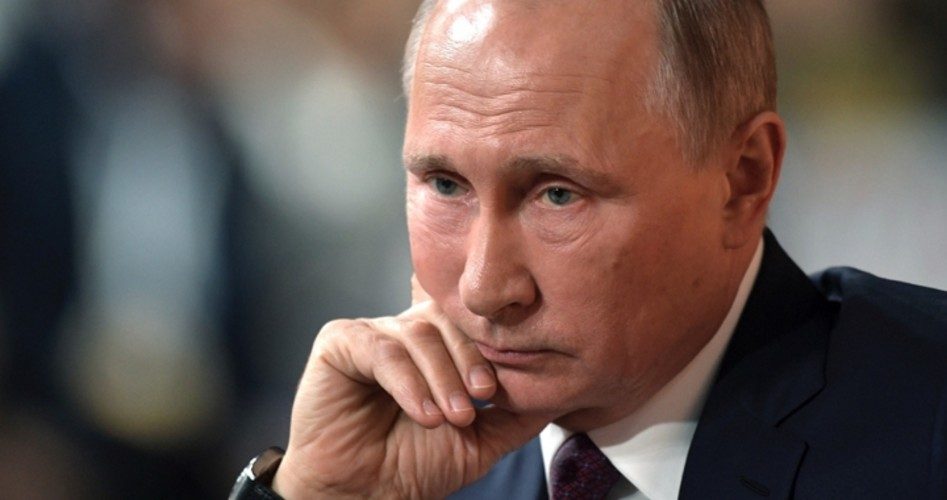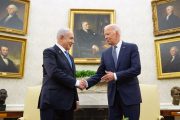
Russian President Vladimir Putin (shown) called President Trump on December 17 to thank him for the advance intelligence information that the CIA provided to Russia’s Federal Security Service (FSB) — information that reportedly helped thwart a major terror plot in St. Petersburg, Russia. A readout of the call was posted on the White House website soon after the call.
A report in the Washington Post said that the suspects arrested by Russian authorities were planning to bomb St. Petersburg’s Kazan Cathedral and other crowded sections of Russia’s second-largest city. The readout stated that based on the information provided by U.S. intelligence, “Russian authorities were able to capture the terrorists just prior to an attack that could have killed large numbers of people.” It noted that no Russian lives were lost and the accused terrorists were apprehended and are now incarcerated.
However, as The New American has reported previously, and as we note below, Putin’s FSB has been exposed as the real hand behind many of Russia’s most sensational and deadliest terrorist attacks, and all proposals for increased “partnership” and “cooperation” with the still-communist Russian state “should be viewed with extreme skepticism,” according to William F. Jasper, The New American’s senior editor, who has written extensively on terrorism and U.S.-Russian relations over the past four decades. “The claim by Putin and the FSB that U.S. assistance helped foil an alleged terror attack, should be viewed as a ‘chess move’ aimed at furthering a larger, long-term objective,” Jasper says. “American globalists and Soviet communists have been attempting a ‘convergence’ of U.S. and Russian intelligence and counter-terrorism since the Gorbachev ‘Perestroika’ era,” he reminds us.
{modulepos inner_text_ad}
The Trump readout added that Trump appreciated the call and told Putin that he and the entire U.S. intelligence community were pleased to have helped save so many lives. The president also stressed the importance of intelligence cooperation to defeat terrorists “wherever they may be.”
The report noted that both Trump and Putin agreed that this successful operation provides an example of the positive things that can be accomplished when both countries work together.
Putin extended his thanks and congratulations to CIA Director Mike Pompeo and the entire CIA, stated the readout, after which Trump called Pompeo to congratulate him, “his very talented people, and the entire intelligence community on a job well done!”
The Post article cited a news report from RIA Novosti — Russia’s state television. That broadcast featured a video showing Russian agents in action, as well as an on-camera confession from one of the suspects. A man identified as Yevgeny Yefimov confessed that he planned to carry out the attack in St. Petersburg. Yefimov later told the court that he was planning to target the Kazan Cathedral. Three other besides Yefimov were arrested on December 17 in connection with the alleged plot.
The state news agency published a list of 17 major terrorist plots that Russian law enforcement has reportedly been able to detect and prevent this year.
The Post cited reports from Russian law enforcement agencies that suspects in the St. Petersburg plot had been using the messaging app Telegram to communicate with Islamic State (ISIS) leaders abroad.
A December 13 report in the Moscow Times said that a Russian court had fined Telegram for not providing Russia’s Federal Security Service (FSB) with the online conversations of two suspects linked to last April’s deadly St. Petersburg metro bombing.
A CNN report cited a December 15 statement from Russia’s FSB saying that seven members of a terror cell had been detained for their involvement in the plot, and that “a significant amount of explosives,” weapons, and “extremist literature” had been confiscated.
CNN reported that the Kremlin also issued a statement about Putin’s call to Trump that said “Putin assured Donald Trump that the Russian intelligence services, upon receipt of information relating to terrorist threats against the [United States] and its citizens, will immediately transmit to its American colleagues in partner channels.”
The CIA declined to comment on that statement.
While the cooperation between our intelligence agencies and Russia’s FSB in fighting terrorists is cited by many observers as a sign of encouragement in the war against terrorism, caution is also called for, as we noted above. It is important to remember that the FSB is a successor intelligence organization to the old, much-dreaded Soviet-era KGB. The FSB even occupies the notorious headquarters of the KGB on Lubyanka Square in downtown Moscow.
An article about the FSB in the Encyclopedia Britannica notes, in part:
Despite early promises to reform the Russian intelligence community, the FSB and the services that collect foreign intelligence and signals intelligence (the SVR and the Federal Agency for Government Communications and Information) remained largely unreformed and subject to little legislative or judicial scrutiny. Although some limits were placed on the FSB’s domestic surveillance activities — for example, spying on religious institutions and charitable organizations was reduced — all the services continued to be controlled by KGB veterans schooled under the old regime. Moreover, few former KGB officers were removed following the agency’s dissolution, and little effort was made to examine the KGB’s operations or its use of informants.
As for the president of Russia, notes the Britannica:
Putin served 15 years as a foreign intelligence officer for the KGB (Committee for State Security), including six years in Dresden, East Germany. In 1990 he retired from active KGB service with the rank of lieutenant colonel and returned to Russia to become prorector of Leningrad State University with responsibility for the institution’s external relations.
While the organization that succeeded the KGB may be seen as rather benign compared to the brutal terrorists of ISIS, the United States should still be wary of cooperating, in any way, with the rebranded mass-murdering organization that tortured and executed millions of people and sent millions more political prisoners to the slave-labor netherworld of the Gulag.
Photo of Vladimir Putin: AP Images
Related articles:
Trump Boots Putin’s KGB Tech Guru Kaspersky Out of Fedgov Computers
Chechen Terrorism: Made in Moscow
Hizb ut-Tahrir: KGB-FSB Connection?
INTERPOL Taps KGB Tech Wizard Kaspersky for Internet Security
Putin Paints Russia as Defender of Traditional Values, Blasts West
Trust KGB’s Kaspersky for Cybersecurity, Says Bloomberg’s Bershidsky
Who’s in Putin’s Pocket — Clinton or Trump?
Putin’s KGB/FSB Converging with New IMF Banking FSB
Russian Troops Coming to U.S. for Terror Drills, DoD Confirms



